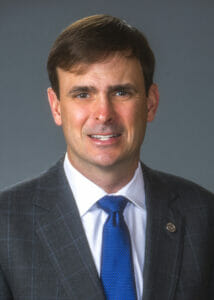
PruittHealth this spring picked up seven more awards recognizing its quality efforts, but the number of residents who have access to the Georgia-based provider’s innovative and expanding post-acute services could be threatened by a federal staffing mandate.
The 54-year-old organization has built its reputation on clinical outcomes and customer service excellence with a consistent, systemwide approach that has netted it a total of 95 AHCA Quality Awards. That represents 91% of its 104 skilled nursing facilities.
One key to his organization’s efforts to maintain quality across facilities post-COVID has been increasing staffing — and holding true to a no-agency policy, PruittHealth Chairman and CEO Neil Pruitt told McKnight’s Long-Term Care News.
The chain put in place a strict no-agency rule early in COVID, which meant closing parts of buildings or putting a “cap and hold” on admissions when staffing levels at given buildings fell below internal thresholds. While those cap-and-holds have all but gone away with small-but-steady staffing gains, they could come back into play if a federal staffing mandate is imposed in a “strict, harsh, immediate way,” Pruitt warned.
Unlike many providers who say they will be forced to hire on more agency (at higher costs) to comply with a tough mandate, Pruitt said he isn’t willing to put care quality into the hands of contracted workers who do not know the patients, policies or procedures and “often hop from job to job.”
“It’s very important culturally for us that we avoid agency at all costs,” said Pruitt, who noted that stopping admissions caused significant financial hardship and drove census from 89% down to 67%. The organization is now approaching 81% across all its facilities.

“We’re feeling very good about our momentum, our ability to hire staff and to retain them. But that has taken hand-to-hand combat to get there. We spend a good portion of company time looking at our staffing needs,” he explained. “The bureaucrats in Washington would have to be blind if they don’t see what’s happening in the economy.”
“To impose [a mandate] in a very strict, harsh, immediate way … it would be almost impossible for any provider to implement. So we have to evaluate all options,” Pruitt added. “But agency would be toward the very, very bottom of that list.”
Pruitt said he is hoping for a reasonable minimum staffing interpretation, one that doesn’t burden providers who strive for quality, while targeting the sector’s bad actors.
“Instead of taking this regulatory approach, I’d recommend a commission that looks at staffing, which brings industry people together, along with folks in the academic field along with folks in the advocacy field,” said Pruitt, who served on the White House Coronavirus Commission for Safety and Quality in Nursing Homes. “Let’s look at the real data: What’s out there, what can be achieved and how we can maximize quality. Is there a way we can incentivize the good behavior, while disincentivizing those bad actors? I think there’s a better way to do it than regulation and mandates. They almost never work, and they won’t work this time either.”
Introspection drives fresh innovation
As an organizational leader, Pruitt says COVID has “taken years off my life.” But he and his leadership team have used the challenges of the past three years to institute new policies and identify opportunities to innovate from both customer service and technology standpoints.
PruittHealth’s approach to sustaining and improving quality is based on rigorous internal controls and immense data checkpoints, including real-time building-level stats that allow leaders to compare their performance against peers while also identifying areas of need. PruittHealth’s own consultancy arm monitors quality improvement initiatives with on-site visits and education, and Pruitt himself shifted clinical reporting from the operational side to the executive leadership time to increase accountability. Almost all of PruittHealth’s nursing homes are also certified by the Joint Commission.
Pruitt honed his quality chops as chair of the American Health Care Association board, where he helped develop the group’s first set of quality benchmarks. He wants to see the sector return to such goals post-COVID as a way of demonstrating that high-quality leaders can shape improvements without mandates.
Creating a steady stream of data and assigning staff to drive quality improvements isn’t without costs. But Pruitt notes providers are empowered when they spend the money up front versus on the back end of a performance issue.
“Any time you have a building that goes into trouble, the amount of resources you have to devote to correct a problem is about 10 times the investment you have to prevent a problem in the first place. We think the ROI on investing in quality is really pretty simple but more importantly, with our outcomes, it allows us to be a preferred partner with hospitals with our customers,” Pruitt said. “We also are fortunate to count many non-related organizations as customers of our ancillary services, which allows us to use our expertise to assist them and enhance the quality care that they provide as well.”
That’s helping Pruitt continue on a growth course. Even as the company expands service lines that support community-dwelling seniors, Pruitt said he remains bullish on skilled nursing.
And on combining the company’s quality marks with a full slate of services. They range from its roots in pharmacy to its new lab capabilities. It makes for an attractive one-stop shop for other provider types.
“Pre-COVID, nursing home care and post-acute care was an afterthought to hospitals. I think what COVID did for us as a profession is, it put us at the table with our partners in acute care,” he said. “And what PruittHealth is able to do is pretty much something that no one else can: We offer all the services after you leave the hospital. We have our own Medicare Advantage plan. We’re able to offer therapy services, medical supply services. We talked about our lab services. We have home health, hospice, a physicians services plan and nurse practitioners. So we’re having conversations with hospitals every day about preferred partnerships where we can integrate into their clinical systems and really streamline the time it takes to be admitted to our system and we can be one shot.”
Whole-spectrum approach
And PruittHealth is also investing in changes that promote quality in the eyes of another key customer base: its patients and its families.
The company has morphed its approach to “radical transparency” about COVID data into the My PruittHealth app. It allows family members to view their loved one’s real-time medical conditions, monitor their vitals and see their medications on a smartphone.
And a new feature will allow them to communicate directly with the administrator and facility staff. It’s a tool almost exclusively used by primary and acute care providers.
“We’re light years ahead of others, and we’ve had good adoption and it’s a great tool for our partners, as well to utilize and stay in touch with the organization,” Pruitt said.
Another COVID-inspired addition is PruittHealth’s own lab service. The first lab launched when nursing homes couldn’t get tests back quickly enough. Now about 60% of the company’s facilities are using Pruitt labs, with plans to move the rest into the system shortly.
As with its consulting arm, PruittHealth will then make those services available to non-Pruitt customers, creating an additional revenue stream. But already the lab is speeding up results and helping clinical teams reduce administrative time with results that feed directly into the EHR and help improve diagnoses and care quality.
Next up: PruittHealth is continuing its efforts to further integrate with acute partners,
including operating some post-acute beds for acute care partners.
“Our theory of owning the whole spectrum allows us to be nimble and move quickly to meet our referral sources’ needs. I also think that as we’re seeing some of these inexperienced operators coming to the market, it really highlights our ability to shine in the quality arena. Not only were we able to keep their quality outcomes for our key care partners, we’re able to streamline the process and then maximize their outcomes to make sure they’re not ending up back in the hospital,” Pruitt said.
“So we’re very bullish on the sector. It’s still going to take some time to recover. We’re hoping that the government doesn’t hit us with too big a blow, and that we can continue the positive momentum with our partners.”



